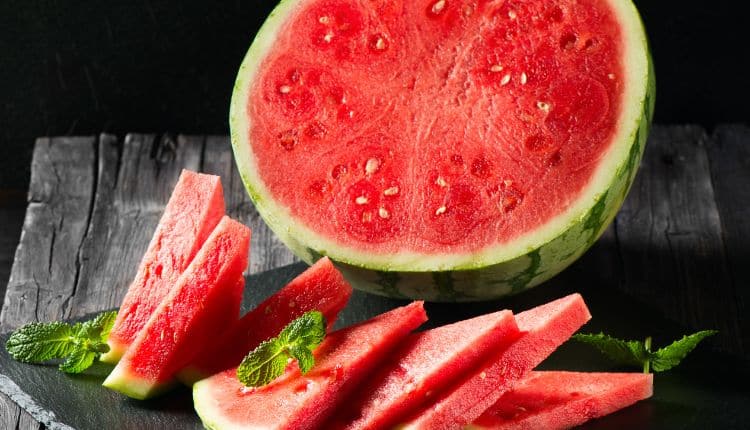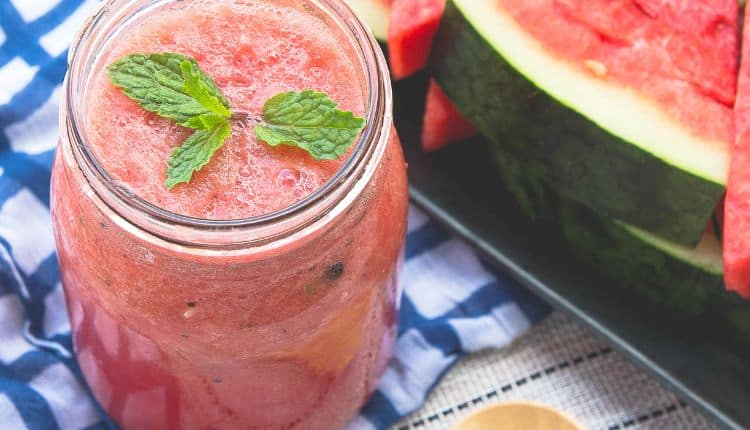Watermelons are an excellent source of lycopene, an antioxidant that may help protect against certain cancers. It is not entirely clear how lycopene works to fight cancer or lower the risk of developing it. However, lycopene has been found to be more readily absorbed by the body than other carotenoids like beta-carotene and lutein.
This means that it can be used by the cells more effectively, potentially helping lower the risk of cancer. In addition, watermelons are also a great source of citrulline and arginine which help reduce blood pressure and maintain a healthy cardiovascular system. In addition, they are also rich in malic acid which may also help to maintain a healthy blood pressure system.
Watermelon Health Benefits – What’s in a Watermelon?
A watermelon is a perfect fruit, but the inside is where it’s at. In this article, we’re going to examine the health benefits of consuming watermelon and analyze the health nutrients found in this tasty fruit. In addition, we’ll cover the best ways to eat watermelon, how to store and preserve it, and how much watermelon to consume in a day. So, what are the watermelon health benefits?
Watermelon contains a high amount of water, with 25% of its weight being water, making it an excellent source of hydration for the body. It’s also high in lycopene which is a powerful antioxidant that can help protect against certain cancers and metabolic diseases. Moreover, lycopene has been found to be more readily absorbed by the body than other carotenoids like beta-carotene and lutein. This means that it can be used by the cells more effectively.
Vitamin C and antioxidants
Watermelon also contains high levels of Vitamin C which is an antioxidant that can help boost immunity and prevent against certain cancers. Watermelon also contains beta-cryptoxanthin, an antioxidant that the body isn’t able to produce on its own. So, consuming a high amount of Vitamin C while eating watermelon can increase the amount of this vitamin in the body.
Help with weight loss
Watermelon is a great fruit to consume while trying to lose weight. It is low in calories and has no fat, sugar, or starch. Moreover, lycopene, an antioxidant found in watermelon, has been found to be more readily absorbed by the body than other carotenoids like beta-carotene and lutein. This means that it can be used by the cells more effectively, potentially helping to lower the risk of metabolic diseases. Additionally, consuming watermelon has been found to significantly increase the amount of water consumed in a day which has been shown to aid weight loss. Watermelon is also high in potassium which regulates water metabolism, potentially aiding weight loss.
Reduce blood pressure
In addition to its antioxidant properties, Vitamin C can also lower blood pressure. Moreover, watermelon is a great source of lycopene which has been found to be more readily absorbed by the body than other carotenoids like beta-carotene and lutein. This means that it can be used by the cells more effectively, potentially lowering the risk of metabolic diseases. In addition, studies have found that consuming lycopene-rich foods like watermelon can significantly reduce blood pressure.
Other benefits
– Watermelon is a great source of fiber, providing the body with important nutrients and improving digestion.
– Watermelon is a great source of lycopene. This antioxidant has been found to be more readily absorbed by the body than other carotenoids like beta-carotene and lutein. This means that it can be used by the cells more effectively, potentially helping to lower the risk of metabolic diseases.
– Watermelon is also a great source of malic acid which may also help to maintain a healthy blood pressure system.
– It’s important to note that watermelon is a low-calorie fruit, making it a great fruit to consume while trying to lose weight.

Consuming Too Much Watermelon?
Although watermelon is an excellent source of lycopene and vitamin C, consuming too much of these nutrients can also be dangerous. Highly concentrated levels of lycopene may boost the amount of lycopene in your body, but it doesn’t mean that you’ve consumed enough lycopene from other foods. Watermelon has a high water content, making it a very hydrating fruit.
Consuming too much water, especially if you’re not used to it, can lead to feelings of thirst and a significant decrease in hydration levels. To avoid this, try consuming half a cup of chopped watermelon per day. This will ensure that you get enough lycopene, but not too much water.
Conclusion
Watermelon is an excellent source of lycopene, a powerful antioxidant that may help protect against certain cancers and metabolic diseases. It is also rich in vitamin C and is a low-calorie, hydrating fruit that can be consumed as part of a healthy diet. Although watermelons are high in lycopene, consuming too much of this nutrient can be dangerous. To ensure that you’re getting the most out of watermelon, try consuming half a cup per day.




